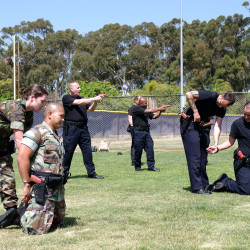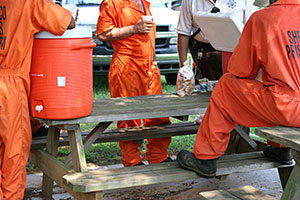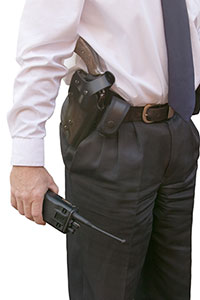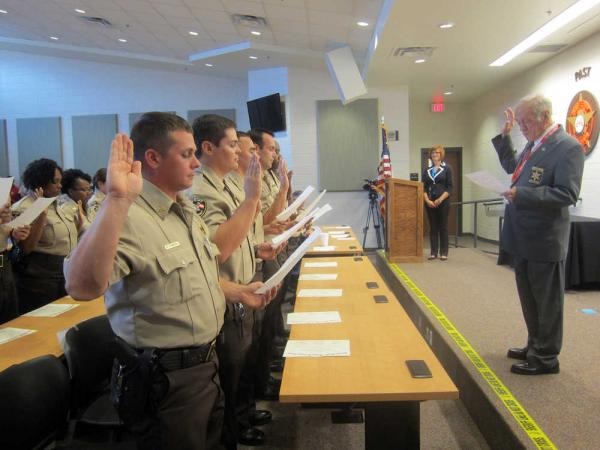Candid Advice about Challenges You Will Face in Your First Year

Now that you are sworn in and don the uniform of a peace officer, you face many unique challenges. Whether you thought about it or not, your new role as a cadet comes with lifestyle changes and unorthodox schedule applications. In your first year of probationary time, training under the tutelage of a few assigned Field Training Officers (FTOs), your body clock will sustain a few hard knocks. Your pre-established lifestyle and habits will be reconfigured. Generally, field training involves learning the tools of the trade on ALL shifts. Whether your department works 8-, 10-, or 12-hour shifts, rest assured (pardon the pundit) you will spend time on each and every shift.
Day Vs. Night Shifts
The dynamics of working as a peace officer vary. As a police officer working the streets, midnight shift sees far more burglars than day or evening shift. Logically, a law enforcer's focus during midnight shift largely pertains to cover-of-darkness criminality. Burglary, drug sales/use, public lewdness, trespassing, DUI, and auto theft (among others) are more commonly observed at night.
During day shift, ample traffic enforcement is conducted since the population of motorists swells with school or work responsibilities. Day shift cadets also experience more interactions with the general public. Midnight shift officers see fewer people, given typical sleep patterns. Evening shift gets a lions-share mixture of both of the aforementioned shifts' activities.
Correctional officer cadets experience more physical activity during the day shift versus midnight shift. Inmates are secured during hours of sleep, requiring less from on-duty staff. Day slots provide escorts, inspections of cells/bunks, motor pooling to/from courts and similar venues, and generally have a few individuals who wish to rock the boat.
Conversely, jail facility cadets experience a more somber night simply by virtue of little-to-no foot traffic. Frankly, the only physical movement a night-shift cadet may witness is in the realm of colleagues' actions (standing- in while break-time is expended) or emergent situations such as inmates requiring medical care.
Physical Challenges
Invariably, every cadet will experience impacts to circadian rhythms (body's innate 24-hour cycles of activity followed by rest). In short, once your body/mind adjusts to a certain period of sleep/wake/sleep cycles, it seemingly revolts when/if that ritualized pattern changes. Shift changes--inherent in law enforcement work--notoriously cause impacts to the body/mind. Fatigue sets in. Moods tend to be foul. Tempers are short. Attention spans wane. Important details may be missed. You can see how such a drastic change can impose ill-health and danger to yourself and others.
Albeit designed to alleviate such stress and allow for some acclimation, most departments schedule shift changes with a weekend off in between the transitions from days to nights, or vice-versa. Needless to say, nutrition, exercise, and proper planning can go a long way, defraying some of these imminent impacts. Adjustments can be made, especially in the way of attitude (acceptance) by not viewing the factors as career-ending.
In the event you are pondering energy drinks and/or alternative measures to stay awake, reconsider. These products may serve as a temporary fix, but they have been shown to impose long-term detriments to health. Again, a well-balanced natural approach (nutrition, exercise, rest) coupled with a sound mental checklist (attitude) can do wonders.
Personal time has similar aspects whereby shift differential wears on the body/mind elements. Off duty always comes with the "expectation to act," as in the proverbial 24/7 police mode, even if you are on a beach, basking in the sun. Hypervigilance is a paradox in that it is both essential to officer safety (survival) and counterproductive to general health. Human physiology is worn away by hypervigilant tendencies. An "always alert" mode may categorize you as an awesomely attentive peace officer--even when off duty--and it can also whittle away at your health.
Keep Yourself Sharp
Discipline is paramount; train the brain. Trust your instincts. Rely on your training. Seek additional education; courses are always available at local academies. Moreover, law enforcement agencies across the American landscape often put on progressive training classes. Stay abreast of techniques in self-defense. Practice defensive tactics often. Keep freshening your so-called "perishable skills." Any or all of these measures can save your health and, consequently, your life.
As required by law to become a peace officer, you are an adult. So, without insult to your maturity and intelligence, consider a few combinations which may backfire. Specifically, consuming alcoholic beverages while armed with a pistol sometimes results in bad joo-joo. Consider pubic versus private domains if you wish to get your buzz on.
Exercise Good Judgment and Self-Control
In August 2014, a class of cadets with the New York/New Jersey Port Authority Police Department (PAPD) went out to celebrate their graduation from the academy. In short, a physical fight ensued, fists were thrown, several of the cadets reportedly puffed out their chests and publicized "We're cops!" Not only did this melee bring severe disrepute to their department, it also resulted in terminations and suspensions.
Yours is a noble profession. No need to shout it out and broadcast your status. Unless required by law, announcing who (what) you are can be unwise.
In November 2014, after an internal investigation was concluded, nine cadets were fired. None of these recruits ever got to experience their first day of training on the streets. Supervisors/instructors at the bar were deemed to have been in a position to pre-empt the fracas, and failed to do so. They were suspended.
Just like that, folly and poor judgment (fueled by alcohol) can decimate a criminal justice career. Again, self-control and self-restraint are common denominators (and should be) in peace officers. Privatize your "fun" to maximize your personal/social time and to retain the integrity of your career choice.
"Squad parties" is what it is often called among criminal justice practitioners. Akin to spending major holidays with your immediate family, the subculture in law enforcement has similar traditions. It is safer. It is wiser. It is, perhaps, a career-saving custom. The PAPD cadets never got to this plateau. Don't let yourself walk down the same self-destructive pathway.
As a cadet, you will be tasked with making myriad split-second decisions. Utilizing this trait in your personal life will not be necessary if you simply exercise sound judgment, implement discipline, and use common sense. The PAPD administration did not merely sweep this fiasco under the rug, it made swift moves to justifiably rid the organization of reckless individuals. Don't be a casualty. Don't be your own undoing. Be a success story!








